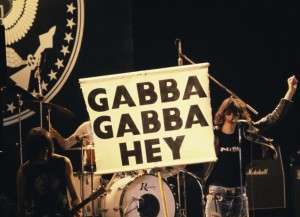Arts Remembrance: Tommy Ramone — Gabba-Gabba Hey, Now and Forever
By Milo Miles
This obit includes the most info on Tommy Ramone, the last surviving original member of the Ramones. He died yesterday at the age of 62.
My first published record review cheered madly for the Ramones’ Leave Home. I got their debut in May, 1976 and that was my peak celebration of America that year. I converted to the Ramones way of punk in a week and the band became the third part of a Holy Trinity that set me on course to write about music for the next 40 years. The Velvet Underground. Iggy and the Stooges. Now the Ramones. All commercial duds. How can you people not understand and go crazy for these bands? As Jonathan Richman would say, it’s as stark as black and white stripes.
The Ramones were as total a package as any rock band, ever. They had a look: longhairs but not hippies or greasers; sunglasses after dark, of course; the tight ‘n’ ripped jeans and leather jackets were perfect because nobody had adopted them as a street uniform before. Cartoon Wild Ones. They had a sound: relentless, yammering beats, shouts and chatter based more in surf-rock than any blues or country tradition, but with an aggression and fury that would pop the Beach Boys like sea foam. This was hangin’ ten on the streets of New York City. They had an outlook: instinctively minimal, teenaged, everyday. I consider the following the ultimate distillation of a Ramones song:
I don’t wanna walk around with you
I don’t wanna walk around with you
I don’t wanna walk around with you
So why you wanna walk around with me?
I don’t wanna walk around with you
Tommy Ramones’s drumming was as key as any component in the band’s makeup. He played on the first three albums only, but all subsequent drumming for the band was an exact copy of his. In a way, Tommy was as spare as Mo Tucker in the Velvet Underground (and had as little use for swing or rhythm ornamentation). He was all about momentum, rising and falling waves, rather than drones. Tommy was also easily the most competent and varied professional in the group — he was accomplished as a sound engineer, record producer, and band manager. Tommy was essential to the Ramones even when he was not behind the drum set.
No way this band was not going to be a hit. (That nowadays Ramones tunes are standard on commercials and at ballparks only confirms there was no innate barrier to public acceptance.) Yet the Ramones’ funny-bad-boy viewpoint never caught on when it could have taken a bow in the spotlights. One explanation is that the group started out and to this day remain on their own special island (just like Manhattan!). They didn’t have the shadowed poetry of Lou Reed or the ragged sexuality of Iggy Pop. As it evolved, punk derived more from the Sex Pistols and the Clash than the Ramones, as much as the latter may have inspired both those outfits.
A sadder, deeper problem was that the Ramones lacked the ability to promote themselves. They could barely pretend to get along. They were united in the band, scattered after the show or out of the studio. And in the ’70s, rock bands, as opposed to solo superstars, had to give off the vibe of brotherhood/sisterhood or at least of a crazy cult. The vision of “The Ramones” held this quartet together, and that wasn’t enough for outsiders. The good part is that the Ramones’s concept remains timeless and untouched. Check out their due tribute in the movie Rock ‘n’ Roll High School (1979) and it’s plain they will last as long as the other greats. Gabba-Gabba Hey, Now and Forever.
Milo Miles has reviewed world-music and American-roots music for “Fresh Air with Terry Gross” since 1989. He is a former music editor of The Boston Phoenix. Milo is a contributing writer for Rolling Stone magazine, and he also written about music for The Village Voice and The New York Times. His blog about pop culture and more is Miles To Go.

